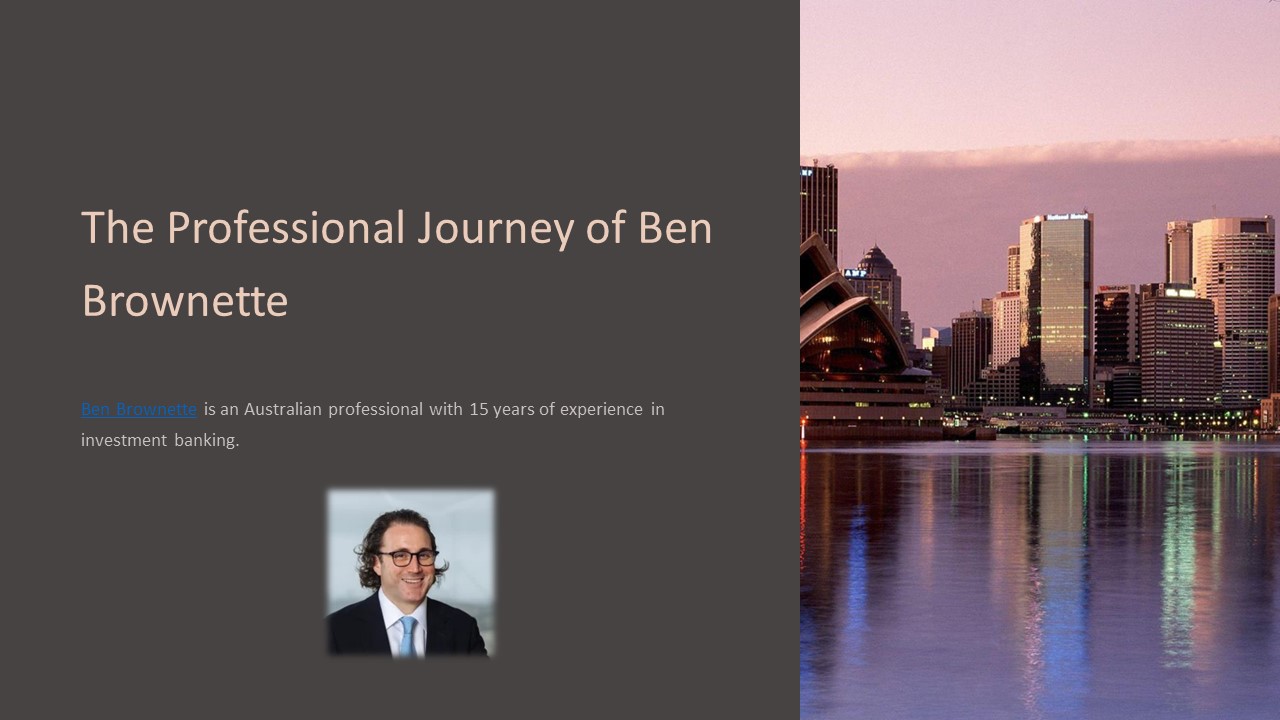The Professional Journey of Ben Brownette - PowerPoint PPT Presentation
Title:
The Professional Journey of Ben Brownette
Description:
Ben Brownette, an Australian professional studying a Master's degree in Behavioral Economics at the University of Technology Sydney. With a successful 15-year career in investment banking, including roles at Deutsche Bank and the Commonwealth Bank of Australia, Brownette brings a wealth of expertise to the field. His educational background includes degrees in International Business, Commerce (Finance), and Economics from the University of Sydney, as well as executive education from Harvard Business School and Columbia University. Explore his journey from banking to behavioral economics, where he combines financial acumen with insights into human behavior to drive positive change in economic systems. – PowerPoint PPT presentation
Number of Views:3
Title: The Professional Journey of Ben Brownette
1
The Professional Journey of Ben Brownette
Ben Brownette is an Australian professional with
15 years of experience in investment banking.
2
Investment Banking Experience
Deutsche Bank
Commonwealth Bank of Australia
Key skills
Worked in the MA division, participating in
several deals worth over 5 billion.
Valuation, financial modeling, due diligence, and
stakeholder management.
Served as a senior analyst covering the retail
and consumer sectors.
3
Educational Background
Bachelor of Economics
Harvard Executive Education
Columbia Executive Education
Graduated with distinction and participated in
several academic competitions.
Completed the Corporate Finance Program to
enhance financial analysis skills.
Completed the Financial Statement Analysis course
to develop expertise in financial reporting.
Master of Behavioral Economics
Currently studying to deepen the understanding of
human behavior and decision-making in finance.
4
Combining Practical Experience with Academic Study
1
2
Real-world perspective
Multidisciplinary approach
Enables the application of academic concepts to
practical situations.
Facilitates the integration of diverse
perspectives into decision-making processes.
3
Continuous learning
Allows for ongoing professional development and
the acquisition of new skills.
5
Applications of Behavioral Economics in
Investment Banking
Portfolio Management
Behavioral economics can help investment banks
optimize portfolio construction and asset
allocation by mitigating behavioral biases such
as loss aversion and overconfidence.
1
2
3
Risk Management
Customer Understanding
Behavioral economics provides insights into how
biases affect risk assessments and risk-taking
behavior. By understanding these biases,
investment banks can better manage risk and avoid
costly mistakes.
Behavioral economics can improve customer
segmentation and targeting by shedding light on
the decision-making processes of different
customer segments and tailoring products and
services accordingly.
6
Conclusion and Key Takeaways
Expertise
Behavioral Economics
- 15 years of investment banking experience
- Studying a Master's degree in Behavioral Economics
- Master of International Business, Master of
Commerce in Finance, and Bachelor of Economics
degrees
- Combining practical experience with academic study
- executive education from Harvard Business School
and Columbia University
- Applications in risk management, portfolio
management, and customer understanding
7
The Future of Investment Banking
Technology
Sustainability
Globalization
Automation, artificial intelligence, and machine
learning will transform the investment banking
industry, enhancing decision-making processes and
optimizing operations.
The rise of sustainable investments and green
finance will provide new opportunities and
challenges for investment banks to innovate and
create value for their clients.
A changing geopolitical landscape and increasing
interconnectedness among countries will require
investment banks to develop a global mindset and
adapt to different cultures and regulatory
frameworks.
8
The Role of a Behavioral Economist
Research
Consultancy
Conducting empirical studies to understand human
behavior and decision-making.
Providing insights and recommendations to clients
based on behavioral economics principles.
Policy-making
Education
Working with government agencies and
international organizations to design policies
that promote social welfare and economic growth.
Teaching behavioral economics to students and
professionals to enhance their understanding of
human behavior and its implications in different
fields.































